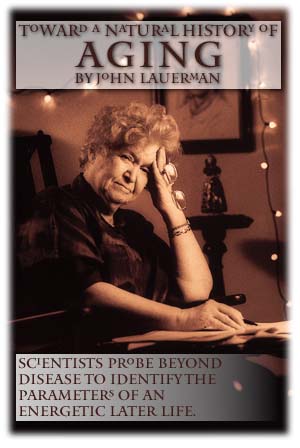Main Menu · Search ·Current Issue ·Contact ·Archives ·Centennial ·Letters to the Editor ·FAQs

It's the same each time we meet. I'm conversing with Henrietta Aladjem at her condominium just outside Boston. Trading ideas across her dining-room table is an elaborate game of confidences, intimidation, braggadocio, hopes, some gloating, and laughter. We start by deploring the assassination of a foreign leader, move to the violence of the inner cities, briefly touch on the nature of learning, and then return, as we so often do, to a discussion of the power of human strength, of the unfathomable reasons why one person flourishes while another flounders.
It's a familiar resting point for us, and as we revisit oft-repeated views, I discern signs of another familiar pattern. Once again, the "elderly" woman I'm talking with has worn me out. Not with shouting, pestering, or shrill demands for attention, but with energy. With persistence, idea-making, and curiosity.
Chances are that you already know of Henrietta, or have even made her acquaintance. The former Widener librarian is one of those ubiquitous personalities who turn up in Hollywood, at the Massachusetts State House, at Congressional offices, at the National Institutes of Health, even the White House.
The revered Canadian physician Sir William Osler once said that if you want to live a long life, get a chronic disease and take good care of it. For better or worse, Henrietta has followed this advice for more than 30 years, since her diagnosis with an autoimmune disease, systemic lupus erythematosus. Her energy seems inexhaustible. She's written five books about lupus. Two weeks ago, she was the featured speaker at the annual meeting of Lupus Canada. This morning, she drove herself to Framingham and bought a couch.
Now she sighs and rests heavily in the dining-room chair where she writes each day, surrounded by old-world furnishings that have accompanied her throughout a lifetime-a mirror-backed china cabinet in which her stationery resides, a couple of dark wood sideboards topped with ornamental plates. She is working on her sixth book. It won't be her last. There's frequent talk of a screenplay, or sometimes a romance novel. Those who have tried to push her toward retirement have underestimated her. For 14 years, Henrietta was editor of Lupus News, published by the Lupus Foundation of America, which she established. In March, she sent out the first copies of Lupus Letter, a new publication for patients with the disease. Henrietta's in her eighth decade of life, and it's utter, hectic chaos.
"I know I am old, but I have taken care of my skin," she says in a strong Bulgarian émigré's accent, only slightly slurred by the Bell's palsy that affects one side of her face. "I do not have the skin of a 79-year-old woman. And you know, inside I am bounding with enthusiasm. There are many, many things that I am deeply interested in, and I have the enthusiasm of a 30-year-oldof a child."
![]()
In his later years, Bertrand Russell said that he never felt like an old man, but rather like a young man who had something not quite right with him. What is age? A synonym of infirmity and frailty? A number? A pattern? A risk factor? When we say that someone is aging, what exactly does that imply? When someone says, "I feel old," we assume the person is fatigued and dispirited. But there are plenty of people whose experience of aging belies that image, people who continue to thrive, without or in spite of illness and disability.
Take the number 65. It's a number commonly associated with slowing down, retirement, a desire for warmer climes and fewer responsibilities...and increased susceptibility to disease. For many Americans, these associations are well founded. The elderly do consume more health services than any other age group. They visit more doctors, take more drugs, spend more days in hospitals and nursing homes, and in general need more care than other people.
But that doesn't accurately reflect the real diversity of the elderly in terms of health and mental status. As the over-65 population blossoms, hidden vitality and energies among these people will surface. Like "old Father William," stereotypes of the helpless, frail elderly are about to be stood on their heads. The Baby Boom countdown to 65 is at 13 years, and as it gets closer, expect the unexpected, because what is about to happen has never happened before on this earth.
As much as any fresh wave of immigrants, the elderly are about to become a much more visible component of our national scene. Daily, 3,000 people turn 65, and only 2,000 above that age die, leaving 1,000 new members of the elderly population. In the 30 years between 1990 and 2020, the over-65 American population will grow by 71 percent, more than twice the rate of growth in the general population. By the year 2020, one out of six Americans will be over 65. The term "retirement community" will describe just about any neighborhood in the United States.
 Public health measures introduced in this century-advances in nutrition, hygiene, and vaccination-have redefined old age. One hundred years ago, it wasn't unusual to become a sage grandparent before your fortieth birthday, or to die soon afterward. In 1900, average life expectancy for American women was 49, for men 46. Since then, we've seen average length of life climb by about 50 percent, to 78.8 for girls and 72.1 for boys. This means that half the people now alive in this country will live past 75.
Public health measures introduced in this century-advances in nutrition, hygiene, and vaccination-have redefined old age. One hundred years ago, it wasn't unusual to become a sage grandparent before your fortieth birthday, or to die soon afterward. In 1900, average life expectancy for American women was 49, for men 46. Since then, we've seen average length of life climb by about 50 percent, to 78.8 for girls and 72.1 for boys. This means that half the people now alive in this country will live past 75.
Needless to say, change like this doesn't occur very often; the previous 25-year increase in life expectancy took approximately the length of recorded history, or about 4,000 years. By the year 2050, average American life expectancy will climb further, to a projected 82.6 years.
"Aging is a new field driven by demographics as much as by scientific discovery," observes Ken Minaker, M.D., chief of a new geriatric medicine unit at Massachusetts General Hospital and associate professor at Harvard Medical School. "Today's elderly are pioneers of a new kind of aging. The next century will be dominated by the concerns of the elderly."
